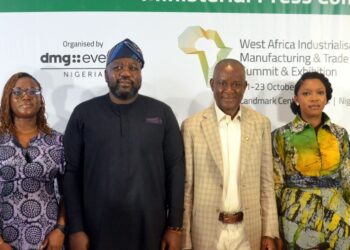The lower non-oil sector growth rate recorded in the third quarter of 2023 highlights some shortcomings in the economic diversification efforts of the Federal Government in Nigeria.
The latest GDP report by the National Bureau of Statistics (NBS) for Q3 2023 shows that the non-oil sector grew at a lower rate of 2.75% in real terms, slightly lower when compared yearly and quarterly.
This sector, which is a major contributor to the Nigerian economy, is driven by sub-sectors, such as Information and Communication (Telecommunication); Financial and Insurance (Financial Institutions); Agriculture (Crop production); Trade; Construction; and Real Estate.
Key Stats
- The non-oil sector grew by 2.75% in real terms in Q3 2023. This rate was lower by 1.52% points compared to the rate recorded in the same quarter of 2022 and 0.84% points lower than the second quarter of 2023.
- In real terms, the non-oil sector contributed 94.52% to the nation’s GDP in the third quarter of 2023, higher than the share recorded in the third quarter of 2022 which was 94.34% and lower than the second quarter of 2023 recorded as 94.66%.
The president’s twin policies of fuel subsidy removal and unification of the naira have fueled an already raging inflation affecting the purchasing power of Nigerians.
Most businesses in the non-oil sector have experienced lower profits due to exchange range losses as they also struggle to meet sales targets amidst waning consumer confidence.
Latest data from Nigeria’s purchasers managers index also slowed for the first time this year in October as businesses complained of tougher macroeconomic conditions.
Subsectors that slowed non-oil sector growth
Agriculture
Despite the huge amount of intervention funds targeted at agricultural activities in the country, the sector still struggles due to issues like insecurity, flooding, and poor infrastructure, among others.
Crop Production, Forestry, Fishing, and Livestock Production are the four sub-activities that make up the Agricultural Sector.
Nominal sector growth in Q3 2023 was 11.06% annually, representing a decline of 9.02% points compared to the corresponding quarter of 2022.
In comparison to the growth rate of 11.42% in the previous quarter, a decline of 0.37% points was observed. Crop Production continued to be the sector’s primary driver.
This is apparent, given that it constituted 92.24% of the sector’s total nominal value during the third quarter of 2023.
The quarterly growth rate during Q3 2023 was 45.59%. The agricultural sector accounted for 26.36% of the nominal GDP during Q3 2023.
The observed rate in this period was comparatively lower than that of the third quarter of 2022 and higher than that of the second quarter of 2023, which stood at 27.55% and 21.07%, respectively.
Also, the agricultural sector experienced year-on-year growth of 1.30% in real terms. This represents a decline of 0.04% points compared to the corresponding period in 2022 and a reduction of 0.20% points from the previous quarter, which recorded a growth rate of 1.50%. It experienced a quarterly growth rate of 39.74%.
In real terms, the sector’s contribution to the overall GDP in the third quarter of 2023 was 29.31%. This figure is lower than the contribution of 29.67% in the third quarter of 2022 and higher than the 23.01% contribution in the second quarter of 2023.
Trade
Trade in the country has been significantly affected by rising inflation and the accompanying low purchasing power of many Nigerians amid rising poverty levels.
During Q3 2023, trade experienced a nominal year-on-year growth rate of 3.10%. This signifies a reduction of 10.07% in comparison to the growth rate of 13.17% observed in the same quarter of 2022 and a decrease of 0.25% in comparison to the growth rate of 3.35% in the previous quarter.
The growth rate from one quarter to the next was 0.71%. In the third quarter of 2023, trade contributed 11.06% of nominal GDP, down from 12.45% in the same quarter the year before and 12.79% in the quarter before.
In real terms, trade experienced year-on-year growth of 1.53% during Q3 2023. This figure was 3.56% lower than the growth rate documented in the corresponding period of the previous year at 5.08%, and 0.89% lower than the growth rate of 2.41% in the previous quarter. -0.74% was the growth from one quarter to the next.
Comparatively, the growth observed in the second quarter of 2023, which stood at 4.97%, was comparatively slower.
Trade accounted for 15.19 per cent of GDP, which was a decrease from the 15.35 per cent it contributed in the prior year and the 16.80 per cent it contributed in Q2 2023.
Transportation and Storage
Another sub-sector hit by the rising inflation and the fuel subsidy removal policy of the currency administration is transportation and storage.
This subsector consists of the following six activities: road transport, rail transport and pipelines, water transport, air transport, transport services and post and courier services.
Comparatively, the sector experienced a decline of -28.57% in nominal terms during Q3 2023. This rate was greater than the -44.16% observed in the previous quarter but lower than the 39.64% documented for the corresponding quarter of 2022.
The growth from one quarter to the next was 0.33%. As a percentage of Nominal GDP, transport activities accounted for 1.16% in Q3 2023, a decline from the corresponding period of 2022, where they contributed 1.89%, and below the second quarter of 2023, where they contributed 1.35%.
The sub-sector experienced a decline of -35.85% in real terms of growth during Q3 2023. The rate exhibits a decline of 77.44% in comparison to the corresponding quarter of the prior year, while it surges by 14.79% in contrast to the quarter before it.
The quarterly growth rate was 4.14%. The sector’s real GDP contribution in the third quarter of 2023 was 0.84%, reflecting a decline from the 1.34% recorded in the previous year and a reduction from the 0.89% recorded in the second quarter of 2023.
Other Contributors to the Non-Oil Sector
- In nominal terms, the ICT sub-sector grew at a rate of 40.27% y-o-y, representing a 19.95% increase from the rate of 20.32% observed in the same quarter of 2022 and a 1.41% decrease from the rate observed in the quarter prior.
- A reduction of 3.84% points was observed in real terms when compared to the rate documented during the corresponding period of 2022.
- Comparing one quarter to the next, the sector demonstrated a decline in real terms of -10.30%.
- Also, accommodation and food services experienced an annual growth rate of 7.02% in nominal terms. This signifies a reduction of 15.13% in comparison to the corresponding quarter of 2022, during which the growth rate stood at 22.15%.
- Growth increased by 0.65% points compared to the previous quarter when it was 6.36%. The third quarter of 2023 witnessed a decline of 3.20% in the real year-on-year growth rate for this sector, which was 3.57% compared to 6.77% in the corresponding period of the previous year.
- In comparison to the growth rate documented in the previous quarter, the current quarter’s rate was 0.18% higher at 3.39%.
- In nominal terms (year-on-year), the construction sector expanded by 3.02% in Q3 2023, down 15.90% points from the same quarter of 2022.
- Also, a reduction of 38.25% compared to the rate documented in the previous quarter was observed. The construction sector experienced a real growth rate of 3.89% year-over-year, which is 1.63% lower than the rate seen in the same quarter last year.
- A 0.47% point increase was observed in comparison to the previous quarter.
More Insight
The World Bank stated in its Africa’s Pulse report for April 2023 that the non-oil sector would be the primary driver of Nigeria’s economy in 2023, as oil production was anticipated to remain subdued due to several factors.
It added that services, trade, manufacturing, construction, and agriculture will continue to drive growth.
According to the most recent Purchasing Managers’ Index (PMI) from Stanbic IBTC Bank Nigeria, business activity in Nigeria’s private sector shrank in October.
This decline capped a six-month upturn that began in March 2023. The headline PMI for October 2023 was 49.1, down from 51.1 in September.
It was explained in the report that readings below 50 indicate a decline in business activity, while readings above 50.0 indicate an improvement is the source of this index.
The PMI report noted that n a decline in business operations was caused by factors such as rising input costs, customers not paying, and currency weakness, among others.
The promotion of non-oil sector growth was identified as a significant element of monetary policy by the Central Bank of Nigeria (CBN) last year.
The apex bank noted that Nigeria’s revenue generation over the past four decades has predominantly been dependent on the oil sector.
To ensure macroeconomic stability as a whole, it advised that it was essential to construct an economy that was diversified and broad-based.
President Bola Tinubu recently assured potential investors in Saudi Arabia of a safe investment environment in Nigeria.
Speaking at the Saudi-Africa Summit in Riyadh, President Tinubu stated that Nigeria is currently engaged in the process of economic diversification, aiming to move beyond dependence on oil and achieve lasting development.
In a statement from his Special Adviser on Media and Publicity, Ajuri Ngelale, it was stated that Nigeria is seeking a bilateral relationship that borders on diverse trade and investment opportunities.
He stated that the country is putting forward policies to redirect its economy from oil dependency to other sectors to generate revenue.
- “Nigeria, like the Kingdom, is diversifying its economy away from oil dependence to promote sustainable development.
- “My administration has undertaken bold economic reforms by removing wasteful subsidies on petroleum and merging our foreign exchange market, among other incentives aimed at improving the ease of doing business in Nigeria.”
However, it seems that the diversification efforts are yet to yield significant results to strengthen non-oil sector growth.


























Yes, leprosy can now be cured. And must be cured in a day!!! Six months is too long time to cure our economic malice. Let this expert proffer a quicker remedy.